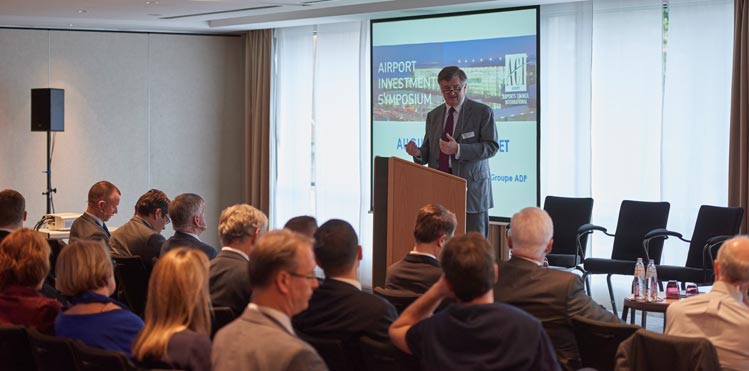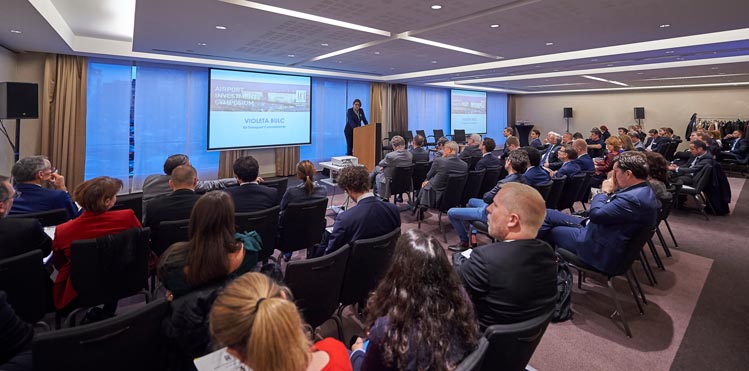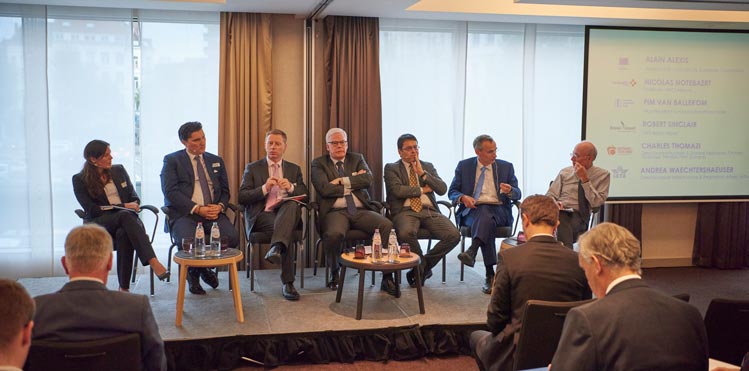In view of the European Commission’s current focus on leveraging private investment and creating the right opportunities for long-term infrastructure investments, as part of its strategy for jobs and growth, ACI EUROPE organised a special Airport Investment Symposium in Brussels on 10 November. The event aimed to advance the discussion about air transport economics in Europe, while also highlighting the economic weight and strategic value of airport investment. Inês Rebelo reports.

EU Transport Commissioner Violeta Bulč, a vocal proponent of investment in the European air transport sector, commented: “Investment drives development. Through investment, we can continue to be a catalyst for change.” For this reason, she declared her support for the organisation of the Airport Investment Symposium for its valuable contribution to facilitating the debate on the importance and need to invest.
It has been nearly a year since the European Commission (EC) launched its Aviation Strategy for Europe, as part of its new political priorities focused on growth & jobs. Within the strategy, the Commission officially acknowledges the primary role that airports play for economic development and recognises that airport competition is a reality. It also advocates for further liberalisation of aviation through open skies agreements to be negotiated between the European Union (EU) and key trading partners based on reciprocity and fair competition principle.
More than all of that, the essence of the Aviation Strategy is the delivery of more value for passengers and for the economy at large. And ACI EUROPE feels that for these reasons, airport investment is entirely in line with these objectives. Leveraging investment, in particular private funding, is precisely one of the priorities of the EU’s ‘Investment Plan for Europe’, of which the European Fund for Strategic Investment (EFSI) is a pillar. The EFSI is an initiative jointly launched by the EC and the European Investment Bank (EIB) to mobilise private strategic investments in order to address current investment gaps in the EU in strategic sectors such as aviation.
With State funding fading and changes in ownership structures, shareholdings and business models increasingly affecting airports of all sizes, private funding has become a prerequisite for many airports to expand their facilities and increase their service quality levels.
Investment is all about more capacity, connectivity and quality
EUROCONTROL forecasts a capacity crunch within which 19 major European airports will be as congested as Heathrow by 2035. However, with increasing government budgetary constraints and tighter EU State Aid rules, public funding is scarce and all but non-existent for the larger airports. In addition, the shift towards markets outside Europe to access new business opportunities makes the improvement of airport connectivity even more important, which necessarily implies more investment. As such, airports need to look at private sources of capital in order to develop and modernise their infrastructure, increase capacity and improve their customer services. By doing so, they are able to remain competitive and to continue to be a driving force for Europe’s economy.

In his welcome address, Augustin de Romanet, President of ACI EUROPE & Chairman and CEO of Aéroports de Paris S.A.-Groupe ADP, stressed the economic value of airports: “The European Commission’s Aviation Strategy recognises that there is an interdependent relationship between aviation and economic growth. Indeed, and as ACI EUROPE has already demonstrated, a 10% increase in air connectivity is associated with a 0.5% increase in GDP per capita.”
Airport investment is thus crucial for Europe and its impact goes far beyond the airport itself. It greatly benefits the surrounding communities and national economies. Let’s not forget that airports contribute to the employment of 12.3 million people and generate €675 billion each year accounting for 4.1% of GDP in Europe, according to the Economic Impact of European Airports study released by ACI EUROPE last year. This is just one of the reasons why ACI EUROPE hosted an Airport Investment Symposium in Brussels on 10 November, which was attended by over 70 people.
With the participation of top institutional and key industry stakeholders, including EU Transport Commissioner Violeta Bulč, Wim van de Camp MEP, Vice President of the European Investment Bank Pim van Ballekom, airlines and European airport CEOs & private investors, the Airport Investment Symposium focused on the importance and challenges of airport investment for Europe’s economy. The discussion panel, which was moderated by Dr Harry Bush, former Group Director of the UK Civil Aviation Authority, was composed of Alain Alexis, Head of Unit at DG GROW, European Commission, Andrea Wächtershäuser, Director Airport Infrastructure & Regulatory Affairs at IATA, Nicolas Notebaert, Chairman of VINCI Airports, Pim van Ballekom, Vice-President of the European Investment Bank, Robert Sinclair, CEO of Bristol Airport, and Charles Thomazi, Director Infrastructure & Natural Resources at Ontario Teachers’ Pension Plan (Europe). It allowed for a lively discussion about the need to invest, the role of regulators and the airline-airport relationship.

In view of the European Commission’s current focus on leveraging private investment and creating the right opportunities for long-term infrastructure investments, as part of its strategy for jobs and growth, ACI EUROPE organised a special Airport Investment Symposium in Brussels on 10 November.
In his welcome address, Augustin de Romanet, President of ACI EUROPE & Chairman and CEO of Aéroports de Paris S.A.-Groupe ADP, stressed the economic value of airports: “The European Commission’s Aviation Strategy recognises that there is an interdependent relationship between aviation and economic growth. Indeed, and as ACI EUROPE has already demonstrated, a 10% increase in air connectivity is associated with a 0.5% increase in GDP per capita.” Mr de Romanet went on saying that “as airports, we have three core responsibilities: deliver more capacity, ensure sufficient levels of service quality and be cost efficient. The combination of these three factors will drive traffic growth and air connectivity. This requires investment. But investment has to be attracted – and then repaid”. How can investment be protected and incentivised? “This is where the evaluation of the Airport Charges Directive that the EC has just started is so important,” Mr de Romanet stressed. The revision and improvement of the regulatory framework is essential to stimulating funding of core investments delivered in an efficient and sustainable way to provide long-term value for consumers.
Investing is what clearly Europe’s largest airports have succeeded in doing. As the ACI EUROPE Analysis Paper on Leveraging Airport Investment to Drive the EU’s Aviation Strategy shows and as Olivier Jankovec, Director General of ACI EUROPE, highlighted in his presentation at the Symposium, the top 21 airports in Europe invested more than €53 billion back into their facilities over the past decade, delivering capacity for an extra 178 million passengers each year – the equivalent of adding an extra London-Heathrow, Paris-Charles de Gaulle and Paris-Orly to the European aviation network. This allowed Europe’s largest airports to increase their direct connectivity by 10.7% and their indirect connectivity by +51.6%, while at the same time it helped them boost passenger satisfaction by +12.4%. All of this was delivered for less than €3 additional per passengers (an average real term increase of 25.4%, far less than the 80% increase levelled at these airports by some dominant airlines).
Why is all of this so important? It shows how airport investment is needed as it directly links to “delivering more capacity, more connectivity and more quality for passengers”, as Olivier Jankovec underlined. This, in turn, expands the economy and boosts growth and jobs, which is fully in line with the EC’s Aviation Strategy for Europe, as aforementioned.
The link with the EC’s agenda on growth and investment was highlighted by the EU Transport Commissioner Violeta Bulč, a vocal proponent of investment in the European air transport sector: “Investment drives development. Through investment, we can continue to be a catalyst for change.” For this reason, she declared her support for the Airport Investment Symposium and its valuable contribution to facilitating the debate on the importance and need to invest in airports. She praised airports for taking a leading role in driving growth and for their proactive attitude towards creating economic and social value through investment.
Commissioner Bulč also reiterated that the EC supports airport investment and is working hard on mobilising private capital: “The Commission wants to bring more private investors on board, that’s why we are proposing new funding mechanisms, called ‘blending mechanisms’, which blend different financial schemes altogether, e.g. grants and private investors.” She also defended a market-driven regulation framework as the approach to follow. Speaking of the Airport Charges Directive, Commissioner Bulč talked about the key contribution of this Directive to ensure fair competition in the industry and outlined the evaluation process which she has just started for the Directive.
Investing to drive economic growth and to boost airport capacity

The discussion panel, which was moderated by Dr Harry Bush, former Group Director of the UK Civil Aviation Authority, was composed of Alain Alexis, Head of Unit at DG GROW, European Commission; Nicolas Notebaert, Chairman of VINCI Airports; Pim van Ballekom, Vice-President of the European Investment Bank; Robert Sinclair, CEO of Bristol Airport; Charles Thomazi, Director Infrastructure & Natural Resources at Ontario Teachers’ Pension Plan (Europe) and Andrea Wächtershäuser, Director Airport Infrastructure & Regulatory Affairs at IATA.
Among the panellists, there was wide consensus that airport investment’s positive externalities are undeniable.
Creating the right conditions for airports to invest in turn helps local and national business. This was clearly put forward by Alain Alexis, Head of Unit DG GROW at the European Commission, when he emphasised the importance of having a “framework giving the airports the possibility to invest and taking stock of the reality of airport competition”. For Nicolas Notebaert, Chairman of VINCI Airports, the stability of regulatory framework is a fundamental ingredient for airport investment: “If the rules are stable, the business will flow and it will be beneficial to the customers and to the whole country. Investment creates jobs.” However, Notebaert warned against overregulation: “Overregulation represents a big threat to investment in Europe because if we are overregulated, it will be more difficult to make business, so there will be less investment.”
Pim van Ballekom (EIB) agreed that a stable regulatory framework is essential to attract investment. He explained how the EIB attracts private investors by saying that “The EIB only finances from 30% to 50% of any project because we want to encourage the private sector to join forces.”
Robert Sinclair, CEO of Bristol Airport, explained how his airport is taking an “incremental and cost-effective approach” to investment, by carefully analysing its investment needs to match the demand created by its environment as close as possible. If it is clear that investment needs to be incentivised, it should be “better reallocated to promote regional airports as main gateways to access the regions”, Sinclair pointed out. “Governments need to encourage passengers to use airports where there is existing capacity.” On this note, Ballekom also defended that there should be more investment in regional airports.
From a private investor’s point of view, Charles Thomazi (Ontario Teachers’) stated that it is important to take a wise approach to investment: “We do scenario analysis to be sure about our investment.”
Bringing the all-important airline perspective to the debate, Andrea Wächtershäuser (IATA) explained that airlines consider that investment is critical but they want to be involved in it early in the process. “What we would like to see is that when there is investment it is cost-efficient and that passengers reap benefits, that it brings benefits for all the industry parties”. “There should be more airport-airline collaboration,” she insisted.
The ability of airports to invest and to mobilise private finance is more required than ever and, in this regard, MEP Wim van de Camp could not be clearer: “Private investment paid by users is the way to go.” The reality is that airports are already managing to attract more and more private investment. It is telling that 41% of European airports have at least some private involvement, according to the 2016 ACI EUROPE Ownership of Europe’s Airports Report, a figure that has only gone up in the past months, following the privatisations of Lyon Airport and Nice Côte d’Azur Airport.
With air passenger traffic at Europe’s airports expected to increase from 1.93 billion passengers in 2015 to 4.78 billion by 2040, as ACI WORLD forecasts, there is the opportunity for the Aviation Strategy to make a big contribution not just to air transport, but the wider European economy as a whole. As ever though, the devil will be in the detail of the regulatory frameworks that help to implement the strategy.







